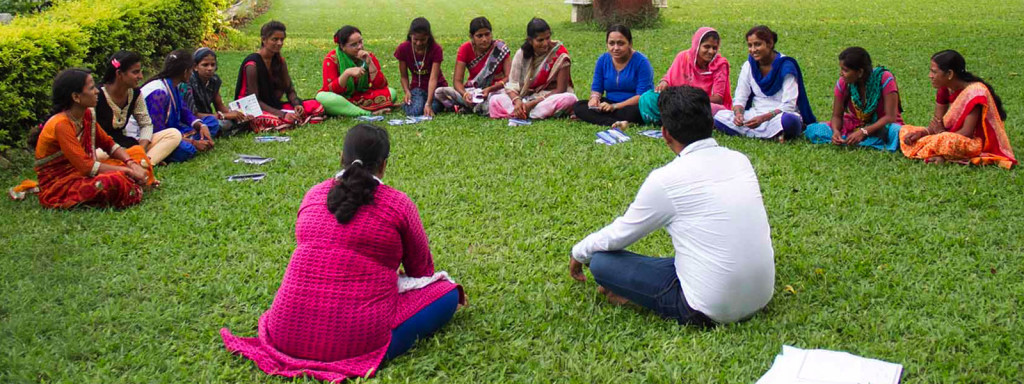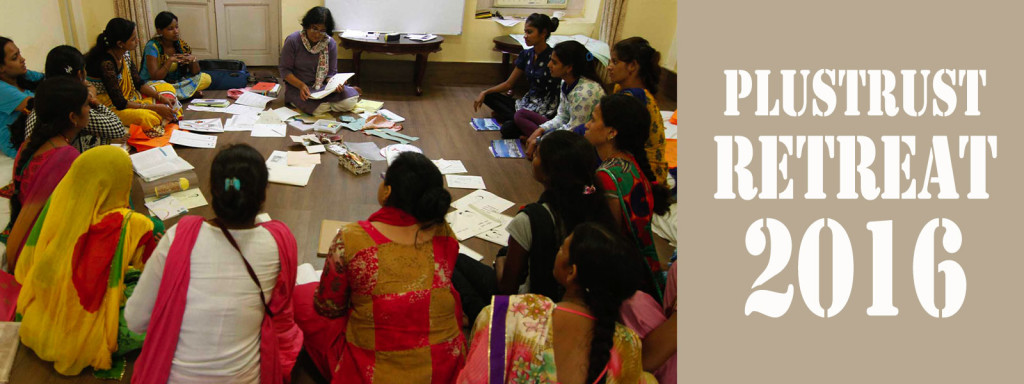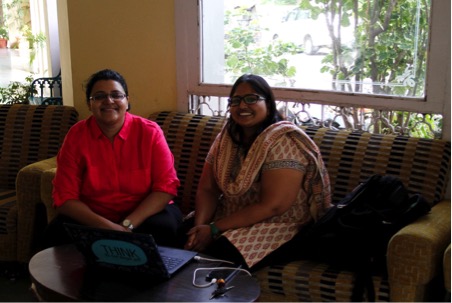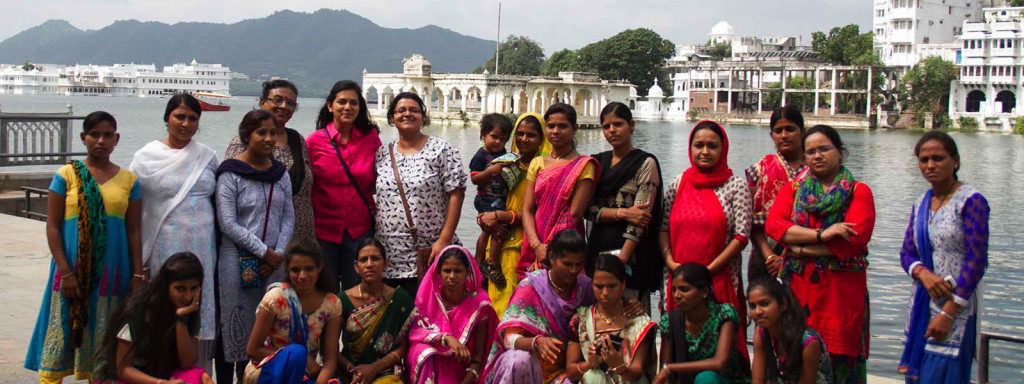Author: lalitha
2016 Plustrust Retreat for Rural Women Edupreneurs
Anand Bhavan in Udaipur was the picturesque setting for our workshop. The organising team, Smriti Kedia and Charu Bhatti , felt privileged to receive over 70 applications. They identified 18 potential fellows after a rigorous screening, including four young women from Madhya Pradesh and one from Uttar Pradesh besides 14 women from South Rajasthan .
Beginning with games and activities, participants actively engaged in discussions and activities to understand different approaches, differentiating clearly between charity, service delivery and enterprise. The field visits to NGOs in education and Animal Aid and the heritage walk to Udaipur city were exciting experiences and group members. Aided by the though provoking session form Ms Lakshmi Murthy, activists Ms. Manju , Ms. Sumitra and Ms Rukmini IAS, they wrestled with their project ideas to come up with specific goals
PlusTrust Retreat 2016
30th August – 2nd September @ Anand Bhavan, Udaipur
Introduction
Team Plustrust was eagerly looking forward to the workshop. We received 70 applications from across the country from a variety of candidates within of 15 days of our announcement, indicating the relevance. Our short list of 18 was based on the idea proposed with a preference for those delivering a service. We began on schedule at 4 p.m. with 14 participants. 4 more joined later as their train was scheduled to arrive at 7 p.m. Smriti welcomed the group and introduced the work of Plustrust. Each participant introduced herself sharing name, location and current activities.
Many participants were already involved in either voluntary or paid (part-time) work in community mobilisation or women’s welfare. They were eager to do more for different segments such as dropout children, illiterate women and pre-schoolers. Some had experience from their association with established NGOs like Jatan, Astha, Seva Mandir and Aajivika. Many wished to continue their own education. Pooja Kumar from Lucknow was with us as a volunteer, bringing in her experience as a banker as well as her skills in photography to capture the entire experience.
Smriti reiterated the purpose of the workshop and our hopes as organisers. Participants then shared their expectations. They wished to learn how to work along with government schooling systems, improving the atmosphere for learning, building relationship with teachers, reaching out to illiterate women, and children out of school due to migration though technically ‘enrolled’, serving girls who were married early and dropped out, offering vocational training and so on.
Speaking of aspirations for themselves, many shared that they want to go ahead and study, to inspire other girls, to become teachers. The attitude was ‘ kar ke dikhana’ , not merely blaming the system , the teachers or the community. Some issues that bothered them were gender discrimination in classrooms, the challenge of living up to parents’ hopes, of becoming an IPS officer, earning respect from the community, establishing own identity (rather than merely being known as a beti, bahu or maa! )
Learning through Activities
Latika and Krishna conducted several activities on the Anand Bhavan lawns to get the group to relax and mingle with each other. The ice breaker was a circle game on paying attention to coded instructions.The group had to sit , run jump, and so on for each number called and this generated lots of fun and energy. In the next game, members found partners and discussed ‘two strengths and two challenges I face’. They then introduced each other to the circle. This was an opportunity for reflection, self disclosure , speaking to the whole group and listening. The next game was on setting individual goals and trying to achieve them in a group. The discovery was that all objectives could be achieved only with cooperation. In another team game groups had to listen carefully for a cue(Ram/ Ravana) , and chase the others..The last game was a lateral thinking activity—to illustrate how we tend to make things more complicated than necessary. We closed around 7 pm

Learning session –Anand Bhavan Lawns
Day 2
Exploring Context and Stakeholder Perspectives
The session began at about 9.10 with introductions from those who arrived late the previous day. Smriti led the group through a role play which served to get members to step into the shoes of the major stakeholders , namely children, parents and teachers. In the course of discussions and presentations the different ideas presented were as follows;
-
Teachers challenges – low enrolment and parents’ disinterest
Parents don’t know that school exist and prefer work for children. They claim they cannot afford clothes or books and are not aware of Government inputs available. Teachers present all the advantages, free school, food to persuade the parents. When parents try to convince children, children complain that they can’t understand what teacher says!
-
Children’s challenges –discrimination, boredom.
Govt school are deemed sufficient for girls,despite her complaints. Boys go to private schools with computers and English. Similarly children experience caste and skin colour discrimination. They find lessons quite difficult and are very bored in class, with no one to explain doubts or encourage .
-
Parents challenges – inability to support the child
Parents grudgingly send children to school, but don’t really have time or the education to support the child’s learning. Other problems discussed were migration, social oppression, child marriage. While the image presented about the teachers seemed too good to be true, the parents seemed to be disengaged with the child.
Building a Value Proposition
The question before the group was ‘What can I do in this context?’ Lalitha invited group to pair up and use a few questions to think through their idea for a project. She explained with an example and Smriti further elaborated, to help participants absorb Lalitha’s poor Hindi.
Questions for Developing a Value Proposition
For: List target customers or beneficiaries. Group them and ultimately define customer or beneficiary.
Who: Define the need or opportunity. What is THE critical issue?
What: Name the product, service or concept.
Is a: Place the product, service, or concept into a generally understood category.
That: Quantify the benefits of the product, service, or concept. Identify the single most compelling benefit
Unlike: List the competitors and competitive alternatives
Our: Differentiate the product, service, or concept. Set it apart from the competition
The group got quite involved in elaborating their ideas. After 30 mins the facilitators reviewed how the activity went and encouraged them to be tough critics of ideas. In this process some found ways of strengthening the ideas. They were asked to continue working on the theme with each other in their spare time.
Social Communication (by Ms. Lakshmi Murthy )
Lakshmi shared the importance of the design in communication materials and the changes she has seen in her own life . She studied Ceramics design and had to change gears after marriage. She could find ways to adjust and make the best of the opportunities in Udaipur and has been learning continuously from the context. She emphasised the need for two way communication and ensuring that the message communicated is kept intact and exact through the use of well designed ICE materials. She distributed examples of materials and went around the circle, discussing the particular tool and taking questions on the various aspects of its design and usage. Local usage and culture are crucial in preparing such materials. She was able to demystify the creative process and instil confidence in the group to try developing their own ICE material.

Ms Lakshmi Murthy’s session in progress
Field Visits
Before closing for lunch, the group was divided into four subgroups and briefed about the four organisations- Jatan, Sikshantar, Gayatri Seva Sangh and STEP (Ajivika) – they would visit in the afternoon. They returned by 6 p.m. to work on their presentations about their experience.
Day 3
Visit to Animal Aid Shelter
The day began with a trip to Animal Aid Unlimited. The group first saw the animals which were being treated-maimed dogs, donkeys and orphaned calves, goats and so on. It was a moving experience and a few girls were reduced to tears. Ms Erika Abrams- Meyers one of the founders, spoke to us sharing her story, early struggles and current challenges. The staff members also shared their experiences.
Presentations on Field Visits
On return, groups made presentations about their field visits the previous day.
STEP -Skill development for youth, with practical training rather than mere theory, particularly special programmes for young women which break stereotyping, placements and financial support. Overall efforts of Ajivika to address issues arising from migrations, preventive measures and services for migrants were noted.
Shikshaantar
Story of Sikshantar, concern for ecological sustainability, aesthetics, handmade , local natural products , recycling (kabad khazana) creative reuse, special library, and the committed team of 30 to 40 people actively, and innovations like cycle based washing machine. The interaction with Ms. Vidhi Jain and her questioning of mainstream education proved inspiring were thought provoking.
Apna Jatan
Details about the centre –profile of children , what they are taught, the methods, and the teacher student relationship were of great interest. They could visualise what they could do in their villages. Uger was also of great interest.
GSS
Work with tribal women on education and welfare, and the school in a slum to provide quality education, special focus on girl’s education and support to join the main stream education system. The variety of interventions was very inspiring
Refining the Value Proposition
Two members came forward to share drafts of their value proposition; the group offered feedback on the ideas . In this process, Plustrust approach to fellowships and the expectations from fellows was also explained. The importance of long term sustainability was emphasised.
Interaction with Ms Rukmini IAS
Ms. Rukmini invited girls to share ideas and ask her questions and a discussion followed on the recent norms about education for women elected representatives. The theme shifted to school and the role of parents and shortage of teachers and the powers vested in SMCs. Rukmini highlighted the need to collaborate with government systems to make sure the children got their entitlements, with focus on what can be done.
Panel Discussion on Community Mobilisation
This was followed interaction with Ms. Manju and Ms. Sumitra, on their experiences in community mobilisation. They explained basics of community mobilization, ways of mobilization and what are the challenges faced during the mobilization, how to approach the community and select the issues accordingly. They emphasised the need to cultivate affection –prerana -for all, women and their entire family including the men. Clarity on what is the issue or theme on which we approach, relevance for the community and preparation are important. The group could relate with their experience very deeply because these guests were from similar background and context.
Day 4
Heritage Walk
The day began with a Heritage Walk within the old city. Our guide, Mr. Manoj from Sikhantar and a resident of the old city, explained local traditions that nurtured both people and the environment.
Developing Project Ideas
After our return, participants worked in four groups to listen to the project ideas and offer feedback. The initial ideas shared were centre for children at risk of dropping out, adult literacy classes for women, working with the schools, also working with pre-schoolers and dropouts. Three of them seemed a little unsure and did not take part in this activity
Budgets and Planning
Pooja explained the basics of preparing a budget for expenses and incomes and a discussion followed. Charu then shared what we expect form them in the proposal using the example of planning for a wedding in the family. She also specified the deadlines for the next stage.
National Curriculum Framework 2005
To understand the concepts and challenges related to the classroom teaching, Ms. Anjali form DIET –Udaipur presented basic principles on which the books are written. She introduced activity based learning by taking examples from their own surroundings and emphasised why this is an important aspect of school education.
Conclusion
To conclude, Participation Certificates were distributed to all the participants over Tea and Snacks.. The workshop ended with full zeal and enthusiasm.

The Organising team Smriti and Charu

The group at Gangaur Ghat
PLUSTRUST RETREAT 2016 FOR WOMEN CHANGEMAKERS 30 AUG TO 2 SEPT 2016 @ UDAIPUR
Calling Young Women determined to improve Education.
Sajid Ali @ Rotte , Kalaburagi (Gulbarga)
Sajid Ali came to hear of Plustrust through Samvada and their Baduku college. He has been running an organisation called ‘Rotte’ for the social uplift of the downtrodden. The objectives of the organization are- working for the rights of workers, women and youth, job oriented training, guidance in placements, environmental oriented training. Continue Reading →
Manoj Singh Rathore @ Parivartan, Itarsi MadhyaPradesh
Manoj runs a small business in Itarsi town and his communication center is a hub for many young people. Manoj wished to work on Bird Conservation in Itarsi town. He noticed that many common birds like sparrows, pigeons, crows were fast disappearing. The decline in their population was very noticeable. The reasons were many -fewer trees, increasing heat, pollution, radiation, machine vibration and so on. He was keen to what could be done. Manoj had tried various things like a bird bath on his terrace and so on. Yet he knew that his lone efforts fell far short of the needs in summer. He was wondering how he could involve more people and do something tangible. Continue Reading →
Lewitt Somarajan @ Lifelab Pune
What we want to do is make learning fun for children studying in poor schools,” says Lewitt Somarajan . “It’s easy for private schools to invest in technologies that engage students, but low-income schools do not have that luxury”. These schools, says the engineer-turned-educationist, require a completely new kind of pedagogy. That’s where their brainchild “LIFE-Lab” (LIFE stands for Learning Is Fun and Experiential) comes in. Continue Reading →
Ashweetha Shetty @ BodhiTree Skills, Tirunelveli
Ashweetha grew up in a small village in Tirunelveli district of Tamil Nadu – playing in the mud, throwing stones, stealing fruit and catching fish ! At 13, she chanced upon the autobiography of Helen Keller, and a realisation dawned upon her – the power to transform life lies within oneself A good student , fascinated with teaching, she started a tuition centre for basic subjects. As the strength of the class grew, so did her confidence. Continue Reading →
